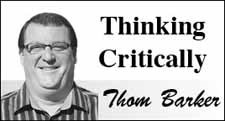The marketers of so-called "wellness bracelets" just won't give up.
Last week, I saw a new TV commercial for the thoroughly debunked Q-Ray "ionized" bracelets. When these unattractive hunks of costume jewellery hit western markets over a decade ago, the company claimed a wide variety of ailments from cancer pain to a poor golf swing were caused by an imbalance of positive and negative ions in your body. Ooo, aah, sounds all sciencey and stuff.
The ionized bracelet is supposed to rebalance the yin-yang (chi), miraculously curing all that ails you by improving energy flow. Wait a second, now it's starting to sound all mystical and preposterous.
As far as the "science" goes, one thing scientists are really good at is measuring ionization. On the CBC consumer advocacy show Marketplace reporters took a Q-Ray bracelet to an electron microscopy lab and, guess what? No ionization. They needn't have wasted their time, though; they could have just asked a high school science teacher who could have told them that solid objects cannot be ionized.
Not that it would matter, anyway, because there is also no such thing as an ionic imbalance in the human body. And despite decades of trying, nobody has ever been able to detect this so-called energy flow in people.
Oh, but we're not talking about scientific, measurable western energy, we're talking about magical, invisible eastern energy. So why bring sciencey-sounding stuff into it?
Right, because it's a scam.
The new ads are considerably toned down. They show a series of unnaturally happy and vigorous people shouting slogans such as "I'm lighting it up," and "I'm burning it up," while engaging in spirited activities. There are no specific claims made, but we are obviously meant to infer what the testimonials in the original ads explicitly said, that Q-Ray will "change your life."
The reason for this kinder gentler approach is because Q-Ray Co., the U.S. distributor that markets this mumbo jumbo has been virtually sued out of existence for false advertising.
In a 2007, U.S. Circuit Court ruling Judge Frank Easterbrook called the company's claims "nonsense" and wrote: "Defendants might as well have said: Beneficent creatures from the 17th dimension use this bracelet as a beacon to locate people who need pain relief and whisk them off to their home world every night to provide help in ways unknown to our science."
Q-Ray Co., and its owner Que Te Park, was ordered to pay back $87 million in refunds to consumers. During the trial, Park couldn't even describe what ionization is.
But if it's a scam, why do so many people swear by their Q-Ray (and other equally bogus) bracelets?
In the first place, it's not as many as you might think. Even before the scam was exposed in open court for what it really is, the company had a 25 per cent refund rate. Presumably, the percentage of people who found the bracelets did not work is much higher than that only they did not bother to return them out of embarrassment or inconvenience.
Secondly, there is the placebo effect. This is a very well documented phenomenon. Controlled, double blind studies have shown that sugar pills are reasonably effective in making hospital patients feel better if, for example, a nurse or family member is present.
Finally, there is confirmation bias. You've just forked over $50 to $350 for something it costs the manufacturer pennies to make, it damn well better work.
Let's examine just one case study. Sanya Richards-Ross is an American sprinter who has become one of Q-Ray's greatest spokespersons. In one of the early TV commercials, she says:
"This has been my best year yet and the only thing I changed after getting with coach Hart, is putting on my Q-Ray"
Whoah, hold the phone! You changed coaches, but somehow the bracelet gets the credit? You have got to be kidding me.
In a later video blog she says: "Is it luck or is it my Q-Ray? I don't know, but why take a chance?"
I don't know, Sanya, what about excellent genes, a rigorous training program, the best coaches and facilities in the world and your competitive spirit? Nope, it's got to be the bracelet. Sheesh.
Science or nonsense
Have you got a burning question about something that sounds like science? Email [email protected] and I will let you know if it is science or nonsense. The best questions and answers will be published in this column.




